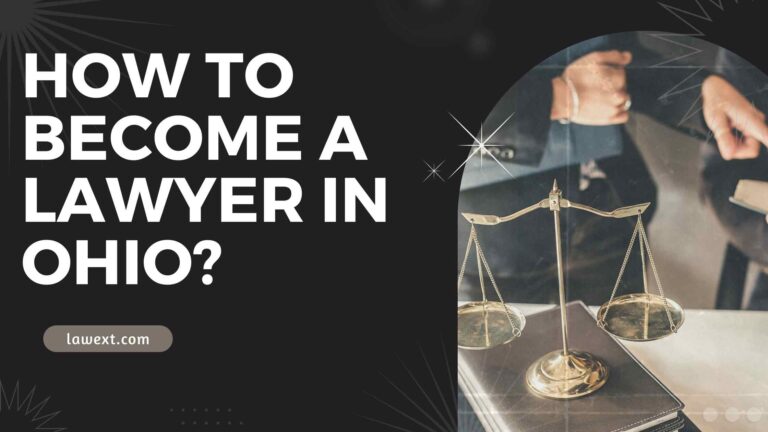How Do I Become a Lawyer in Florida?

To become a lawyer in Florida, you need to complete a 4-year undergraduate degree and then attend an American Bar Association (ABA) approved law school. After graduating from law school, you must pass the Florida Bar Exam and meet other requirements set by the Florida Board of Bar Examiners.
Table of Contents
How Do I Become a Lawyer in Florida? Becoming a lawyer can be a rewarding career choice for those who are passionate about the law and helping others. Whether you’re embarking on a new career path or looking to further your education, the process of becoming a lawyer in Florida requires careful planning and dedication.
This guide will outline the steps you need to take to become a lawyer in the Sunshine State. From earning a bachelor’s degree to passing the rigorous Florida Bar Exam, we will cover the essential requirements and provide useful insights to help you navigate the journey towards a successful legal career in Florida. So, let’s dive in and discover how to become a lawyer in the state of Florida!
Requirements To Become A Lawyer In Florida
To become a lawyer in Florida, you need to complete a bachelor’s degree, attend law school, pass the Florida Bar Exam, and pass the Multistate Professional Responsibility Exam (MPRE). It’s a rigorous process that requires dedication and determination.
If you have a passion for justice and aspire to become a lawyer in the Sunshine State, it’s crucial to understand the requirements set forth by the Florida Bar Association. These requirements encompass education, passing the bar exam, and demonstrating good character and fitness. By meeting these criteria, you can set yourself on the path to a successful legal career in Florida.
Education
In terms of education, aspiring lawyers in Florida must complete a minimum of a bachelor’s degree from an accredited college or university. While there is no specific major required, prospective lawyers typically pursue undergraduate degrees in subjects such as political science, criminal justice, or pre-law. It is important to note that a bachelor’s degree does not automatically qualify individuals to practice law; aspiring lawyers must proceed to the next step in their journey.
Bar Exam
Passing the bar exam is a significant milestone on the path to becoming a lawyer in Florida. The Florida bar exam is administered twice a year and consists of various components, including the Multistate Professional Responsibility Exam (MPRE). This rigorous examination evaluates a candidate’s knowledge of both state and federal laws, professional ethics, and legal procedure. Successful completion of the bar exam is essential to becoming eligible for admission to the Florida Bar.
Character And Fitness
In addition to the educational requirements and passing the bar exam, aspiring lawyers must also demonstrate good character and fitness. The Florida Board of Bar Examiners assesses the moral character and fitness of applicants before granting them permission to practice law in the state. Applicants must provide detailed information about their personal and professional backgrounds, including any previous legal or disciplinary issues. The board carefully reviews each applicant to ensure their integrity and fitness to serve as legal professionals.
In conclusion, aspiring lawyers in Florida must meet specific requirements to practice law in the state. These include obtaining a bachelor’s degree, passing the bar exam, and providing evidence of good character and fitness. By fulfilling these requirements, individuals can embark on a fulfilling legal career in the beautiful state of Florida.

Credit: www.wikihow.com
Steps To Become A Lawyer In Florida
To become a lawyer in Florida, there are several essential steps you need to follow. From earning a bachelor’s degree to passing the bar exam and completing the Florida Bar Application, the journey to becoming a lawyer in Florida requires dedication, commitment, and perseverance. Let’s break down the steps you need to take in order to pursue a career in law in the Sunshine State:
Earn A Bachelor’s Degree
Before you can attend law school in Florida, you must first earn a bachelor’s degree from an accredited college or university. It’s important to choose a major that aligns with your interests and complements your future legal career. While there is no specific pre-law major required, many aspiring lawyers choose to study political science, criminal justice, or philosophy to gain a strong foundation for their legal education.
Attend Law School
After completing your bachelor’s degree, the next step is to attend law school accredited by the American Bar Association (ABA) in Florida. Law school typically takes three years to complete, during which you will delve into various areas of law, develop essential legal skills, and gain practical experience through internships or clerkships. It’s a challenging but rewarding journey that prepares you for the legal profession.
Pass The Bar Exam
Upon graduating from law school, you will need to pass the Florida Bar Exam to become a licensed attorney in the state. The bar exam assesses your knowledge of both state and federal law, as well as your ability to apply legal principles to real-world scenarios. Preparation is key, and many aspiring lawyers enroll in bar exam prep courses to maximize their chances of success.
Complete The Florida Bar Application
Once you have passed the bar exam, you must complete the Florida Bar Application to be admitted to the Florida Bar. This application requires detailed information about your education, employment history, and character fitness. It’s important to carefully and accurately fill out the application to ensure a smooth admission process.
Undergo Character And Fitness Evaluation
As part of the admission process, you will undergo a character and fitness evaluation conducted by the Florida Board of Bar Examiners. This evaluation is designed to assess your moral character and fitness to practice law in Florida. It involves disclosing any past criminal convictions, disciplinary actions, or other relevant matters that may impact your eligibility for bar admission.
Choosing A Law School In Florida
When it comes to pursuing a career in law, choosing the right law school can make all the difference. Florida offers several reputable law schools that can provide you with a strong foundation for your legal career. In this article, we will discuss the key factors to consider when selecting a law school in Florida.
Accreditation
One of the critical factors to consider when choosing a law school in Florida is accreditation. Accreditation ensures that the law school meets the necessary quality standards and that its programs have been approved by the American Bar Association (ABA), which is the primary accrediting body for law schools in the United States.
Attending an accredited law school not only ensures that you receive a high-quality legal education but also allows you to sit for the bar exam. Without attending an accredited law school, you may not be eligible to practice law in Florida or any other state.
Curriculum
The curriculum of a law school plays a crucial role in shaping your legal education. It is essential to review the curriculum of each law school you are considering to ensure it aligns with your academic and career goals.
The curriculum should provide a broad range of courses that cover various areas of law, such as criminal law, constitutional law, contracts, and legal writing. Additionally, some law schools offer specialized programs or concentrations that can help you focus on specific areas of interest, such as environmental law or intellectual property law.
Faculty
Another critical aspect to consider when choosing a law school is the faculty. The faculty members should be experienced legal professionals who are dedicated to providing students with a quality education.
Look for a law school that has a faculty with diverse backgrounds and expertise in different areas of law. Professors who have practical experience in the legal field can bring valuable insights to the classroom and provide real-world examples that enhance your learning experience.
Internship And Job Placement Opportunities
Practical experience is essential in the field of law. Therefore, it is vital to consider the internship and job placement opportunities offered by the law school.
Look for a law school that has strong connections with local law firms, government agencies, and other legal organizations. These connections can provide you with valuable internship opportunities, which will allow you to apply your knowledge in a real-world setting.
Favourable job placement rates are also an indicator of a law school’s effectiveness in preparing students for the legal profession. Research and compare the job placement rates of different law schools to find the ones that have a track record of helping their graduates secure employment in the legal field.
Bar Passage Rates
In addition to accreditation, one of the vital considerations is a law school’s bar passage rate. This rate indicates the percentage of graduates who pass the bar exam and receive a license to practice law.
High bar passage rates indicate that the law school’s curriculum and teaching methods effectively prepare students for the rigorous bar exam. It is crucial to choose a law school with consistently high bar passage rates to maximize your chances of success.

Credit: issuu.com
Preparation For The Bar Exam
Becoming a lawyer in Florida requires careful preparation for the bar exam. This challenging assessment is a crucial step towards gaining your license to practice law in the state. To help you succeed with your bar exam, here are some key strategies and tips:
Bar Review Courses
Enrolling in a comprehensive bar review course can greatly enhance your chances of passing the exam. These courses are designed to provide you with a thorough and structured review of all the essential topics that will be tested. They often include video lectures, practice questions, and study materials specifically tailored to the Florida bar exam.
Bar Exam Study Schedule
Creating a well-organized study schedule is essential for effective exam preparation. Set aside dedicated time each day to review the material and practice answering exam-style questions. By sticking to a study plan, you can ensure that you cover all relevant topics and have enough time for thorough revision.
Practice Exams
Regularly practicing with sample bar exam questions is crucial to familiarize yourself with the format and types of questions you may encounter. Taking practice exams under timed conditions will also help you improve your speed and accuracy. Analyze your performance and identify areas where you need improvement, then focus your studying on those specific topics.
Essay And Multiple-choice Exam Techniques
Developing effective essay and multiple-choice exam techniques is key to performing well on the bar exam. For the essay portion, practice writing concise and well-structured responses that directly address the question prompts. Familiarize yourself with the specific elements that Florida bar examiners look for in essay answers. For multiple-choice questions, learn strategies such as process of elimination and informed guessing to improve your chances of choosing the correct answer.
Time Management
Effective time management is essential when it comes to the bar exam. Allocate sufficient time to each section of the exam based on its weightage. Avoid spending too much time on a difficult question as it may impact your ability to complete other questions. Practicing under timed conditions during your study sessions will help you develop the necessary skills to manage your time effectively during the actual exam.
Career Path And Opportunities As A Lawyer In Florida
Becoming a lawyer in Florida presents a rewarding career path with diverse opportunities. As a lawyer in Florida, you can specialize in various legal practices, work in different environments, and enjoy competitive salary and benefits. Continual legal education and networking are vital for professional development in this field.
Types Of Legal Practice
Lawyers in Florida can specialize in various legal practices, including civil rights, criminal defense, family law, real estate, and many more. Each area offers unique challenges and opportunities for lawyers to make a difference in their clients’ lives.
Work Environment
The work environment for lawyers in Florida can range from law firms to corporate legal departments and government agencies. Some lawyers also opt for private practice orsolo practice, each offering a distinctive work setting and dynamic challenges.
Salary And Benefits
Lawyer salaries in Florida vary depending on factors such as experience and specialization. On average, a lawyer in Florida earns a competitive salary along with benefits such as healthcare and retirement plans, making it a financially rewarding career choice.
Continuing Legal Education
Continuing legal education is essential for lawyers in Florida to stay abreast of the latest developments in the legal field. Professionals are required to pursue continual legal education to maintain their license and provide the best legal services to their clients.
Networking And Professional Development
Networking opportunities and professional development programs empower lawyers in Florida to expand their professional connections and gain valuable insights. Building a strong professional network is crucial for career advancement and personal growth in the legal sector.
Conclusion
Becoming a lawyer in Florida requires dedication and determination. By following the necessary steps, such as obtaining a degree, passing the bar exam, and gaining experience, you can achieve your goal. Remember to stay informed about changes in legal requirements and regulations as you progress in your career.
With perseverance, you can make a difference in the legal field.
Introducing Jonah Plum, a legal luminary whose journey through the corridors of justice has been intertwined with the eloquence of the written word. Born and raised in the vibrant city of Seattle, Washington, Jonah's early fascination with language and debate laid the foundation for a remarkable career in law.
Jonah's scholarly odyssey began at Harvard Law School, where they immersed themselves in the study of jurisprudence, honing their analytical prowess and legal acumen. Armed with a law degree, they entered the legal arena, navigating courtrooms and boardrooms with a fervor for justice. Yet, it was the realization of the transformative power of the written word that led Jonah to pivot from legal briefs to the world of blogging.
A digital advocate in the truest sense, Jonah recognized the need for demystifying legal concepts and making them accessible to a broader audience. This blog, a virtual repository of legal insights, transcends geographical boundaries, connecting with a global readership hungry for clarity amidst legal complexities.
Beyond the black letter of the law, Jonah delves into the human stories that underscore the legal landscape. Their writing goes beyond legal analysis, weaving narratives that humanize the law, shedding light on its impact on individuals and society.






